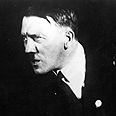
Headstone of Hitlers' parents' grave removed
Tombstone marking grave of Nazi Fuehrer's parents removed at request of family descendant. Mayor of Austrian village 'happy with the decision'
The tombstone marking the grave of Adolf Hitler's parents, a place of pilgrimage for neo-Nazis, has been removed from an upper Austrian village cemetery at the request of a descendant, and the grave is ready for a new burial, officials said Friday.
Walter Brunner, mayor of Leonding village, said the stone with the faded black and white portrait photos of Alois and Klara Hitler was taken down Wednesday. Village priest Kurt Pitterschatscher said the rented grave was available for a new lease.
Related stories:
- 'Hitler had son with French teenager' Could US Demjanjuk grave become neo-Nazi shrine? Hitler's 'LA crib' to become picnic area
Austrian graves are usually leased for periods of 10 years. The lease is renewable and can be willed to friends or relatives.
Asked whether he would have trouble persuading people to let their loved ones share a grave with the parents of a man whose name is a universal epitome of evil, Pitterschatscher said, "I really haven't thought about it."
Pitterschatscher said the stone and black marble marker, topped by a granite cross, was removed without ceremony by a stonemason hired by the relative, described as an elderly female descendant of Alois Hitler's first wife, Anna. What's left at the site is a white gravel square and a tree.
He said he did not know the woman personally and did not identify her by name but cited her request for termination of the grave lease as saying she was too old to care for it and tired of it "being used for manifestations of sympathy" for Hitler.
Grave became Nazi shrine
Hitler's roots are in Braunau, near Leonding, which is commonly identified as his hometown after the village that he was born in was incorporated into Braunau in 1938. But he and his family moved to Leonding in 1898 when he was 9 and lived there until Hitler was age 15.
Leonding itself first assumed cult status for his followers after Hitler visited his parents' grave and the nearby family house following the 1938 annexation of Austria by Nazi Germany.
Anti-extremist groups say neo-Nazis, sometimes coming in groups, placed flowers and Nazi symbols on the grave.
Robert Eiter, with the Upper Austrian Network Against Racism and Right-Extremism, said the latest incident was on All Saints day, Nov. 1, when an urn was left with the inscription "UnvergeSSlich" — German for "unforgettable" and alluding to Hitler's SS shock troops.
"A lot of flowers and wreaths were deposited there from people who clearly were admirers," he said. "It had to do with the son and not the parents."
Brunner, the mayor, said he was "happy with the decision," to remove the tombstone and Eiter said most Leonding residents also supported it.
- Receive Ynetnews updates directly to your desktop










